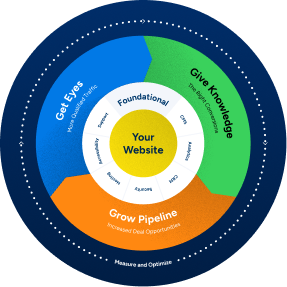The effectiveness of an organization’s inbound marketing strategy is often measured by sales conversions and bottom-line profitability at the end of the day. However, the average organization’s sales pipeline is an extremely complex and intricate system that can come crashing down if it is not constantly assessed and adjusted to meet consumer expectations. Each step of the buyer’s journey is crafted to either attract or maintain the attention of a very specific buyer persona. GoingClear helps bring success to your B2B business through MQL tracking.
Content marketing and inbound strategies are designed to attract, while calls-to-action peppered across your website are designed to place eager and willing consumers in front of your capable sales staff. In between, there’s a crucial process that many organizations struggle with that should, when properly executed, help shape the indecisive visitor into a confident and eager buyer. Much of this process is accomplished through effective marketing and remarketing tactics that inspire potential clients to visit your website multiple times for various reasons, a process designed to gradually remove any doubt that your product or service offers the best solution for their needs.
What Is an MQL?
Even the most streamlined and targeted marketing campaign is bound to attract the attention of website visitors that will never become paying customers. Even more likely, a well-planned marketing initiative will result in a large number of leads who will take significantly more effort and resources to convert than they will ever give back in sales – and that’s if they ever convert at all. If you continue to drill down on leads that meet the targeted buyer persona, however, you hit the sweet spot – that is, what the industry refers to as marketing qualified leads. These leads are likely to convert as long as your marketing team provides them with the right attention and experiences throughout the buyer’s journey.
Referred to by the shorthand of MQL, these leads eventually can become considered sales-qualified leads (SQLs) who are almost guaranteed to convert as long as your sales team is on the ball. Where many organizations tend to drop the ball is that they don’t have a clear definition of what constitutes an MQL because they haven’t put in the effort to determine what behaviors and actions across their website and inbound marketing systems SQLs have in common. A strong sales process then clearly tracks user behaviors and actions across the organization’s digital real estate to ultimately identify metrics such as the number of times an MQL will visit the site, request information, or read the company blog before they click through to the calls-to-action that land them in front of the sales team, ready to make a purchase.
How To Calculate The Required Number of MQLs In Order to Meet Your Sales Goals
The effectiveness of any stage of your sales funnel can generally be calculated as a function of conversions at each level relative to the goals you have at each level. In the case of MQLs, where the goal is to convert them into sales-qualified leads, you’ll need to determine from historical data the average number of leads it took to reach a specific number of sales conversions.
Let’s keep it simple and say that your organization sells a service to customers, and you’ve budgeted for the quarter a sales goal of $100,000. The service costs your clients $20 per quarter, so in order to reach your sales, you’ll need to sell 5,000 service contracts. Looking through your sales closure percentage, you learn that your sales team closes on 20% of the sales calls they field as SQLs.
Working backwards from there, your marketing strategy needs to push at least 25,000 leads through the buyer’s journey to the point that they qualify as MQLs ready to be nurtured and elevated to SQL status. If you continue to follow this process back through to your inbound channels, you’ll find that the total number of leads will need to be significantly higher, as not every lead will meet the criteria to become an MQL.
MQLs Are Useful for Both B2B and B2C Alike
While B2B and B2C organizations have drastically different sales cycles, goals, and overall marketing approaches, the fact that both involve sales and generating leads, marketing qualified leads play an important role in each industry type. However, it’s important to understand that MQLs do not have an established, standard definition, and what constitutes a well-qualified MQL for a consumer-focused sales team cannot be the same for a service or product-based organization that sells to other businesses. The takeaway then is that it’s crucial for every organization with a sales team to utilize the metrics and KPIs directly related to their organization to establish what constitutes an MQL for their organization, and build a sales strategy around that clearly defined model.
Track and Nurture MQLs into SQLs
It’s also extremely dangerous in your budgeting and sales planning, to tie ROI and sales goals to the MQL level, as there is zero guarantee that an MQL will spend a single dollar on your business. MQLs, rather, are unique and require special attention that varies from lead to lead. The important thing is to ensure your customer relationship management (CRM) solution helps to track consumer behaviors and activities across your social media and website, keeping track of the forms submitted for more information, or downloads of your organization’s informational documents and free publications. Throughout this process, the CRM should be built around maintaining communication with these leads and keeping track of the behaviors your organization has deemed to be necessary first steps prior to handing off an MQL to the sales team as an SQL.
GoingClear Can Adjust Your Website and Provide the Tools Necessary to Meet Your MQL Tracking Goals
Effective lead generation strategies are crucial for B2B and B2Cs across all industries. If you’re in either sector and you find your sales team coming to you and saying, “How do I get more MQLs, so I have a better chance of meeting my sales goals,” then you have the right Boston-based digital marketing firm. Our team of lead generation specialists understands how to navigate the complicated and diverse steps of website generation, including creating content that attracts and retains visitor attention and drives the reader further along the buyer’s journey; refining the sales funnel and calls to action to support building stronger relationships; and finally how to leverage modern tools to enhance the brand experience such as strong video content and interactive visual media. These and other strategies to strengthen your sales team’s practices are all just a click away, so get in touch with our team now to find out how we can help nurture leads into sales.

